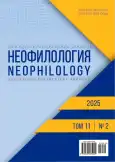Interpretation of the science fiction novel by V. Pelevin “Transhumanism Inc.” in terms of “nature-text”
- Authors: Liu Y.1, Wang X.1
-
Affiliations:
- Nanjing Normal University
- Issue: Vol 11, No 2 (2025)
- Pages: 477-491
- Section: IDEAS OF YOUNG SCIENTISTS
- URL: https://journal-vniispk.ru/2587-6953/article/view/297448
- DOI: https://doi.org/10.20310/2587-6953-2025-11-2-477-491
- ID: 297448
Cite item
Full Text
Abstract
INTRODUCTION. Contemporary Russian writer Viktor Pelevin combines the qualities of an author of best-selling and postmodern works of the science fiction genre. His novel “Transhumanism Inc.” is both an example of serious classical literature and a popular book that is well loved by readers. The purpose of the study is to identify the semantic interpretation of the novel “Transhumanism Inc.” by V. Pelevin from the perspective of a combination in his literary work of the categories “mass character” and “classic” and the phenomenon “Umwelt”, reflecting the idiostyle of the author.
MATERIALS AND METHODS. The research material is the novel “Transhumanism Inc.” by Pelevin. The method of interpretation is used as a more definite way of understanding a literary text, which requires the involvement of non-linguistic information. To identify the deep meaning of a literary text, a method of analysis “nature-text” is used, which is based on the concept “Umwelt”. A descriptive approach is used to comprehend the writer’s idiostyle.
RESULTS AND DISCUSSION. The interpretation of a literary text can be considered as the creative sphere of the writer and as the creative sphere of the reader. The peculiarity of V. Pelevin’s idiostyle is liberation from constructivist rationalism and a return “to naturalness”, in the implementation of the effect of liberation of the textual meaning of the novel for reader interpretation.
CONCLUSION. A new look at the study of Pelevin’s work has been identified, based on identifying a system for interpreting knowledge about the ethical regime of reading and immersing the reader’s consciousness in an ecological state.
Keywords
About the authors
Yitong Liu
Nanjing Normal University
Email: 18845796548@163.com
ORCID iD: 0009-0008-3647-2292
Post-Graduate Student, Russian Language and Literature Department
China, 210097, People’s Republic of China, Nanjing, 122 Ninghai Road StXin Wang
Nanjing Normal University
Author for correspondence.
Email: nnuwangxin@163.com
ORCID iD: 0009-0008-3708-0530
Post-Graduate Student, Russian Language and Literature Department
China, 210097, People’s Republic of China, Nanjing, 122 Ninghai Road StReferences
- Altynbaeva G.M. The relationship between human and artificial intelligence in Victor Pelevin’s novels “S.N.U.F.F.”, “iPhuck 10”, “Transhumanism Inc.”. Filologiya i chelovek = Philology & Human, 2023, no. 4, pp. 215-225. (In Russ.) https://doi.org/10.14258/filichel(2023)4-14, https://elibrary.ru/ceaxyc
- Zarubin D.D. Umwelt as a modelling of the world. Rossiiskii lingvisticheskii byulleten’ = Russian Linguis-tic Bulletin, 2024, no. 3 (51), Art. 9. (In Russ.) https://doi.org/10.18454/RULB.2024.51.1, https://elibrary.ru/jvcrpa
- Van Sh. Viktor Pelevin: a typical example of post-Soviet literature. Russkaya literatura i iskusstvo = Rus-sian Literature and Art, 2013, no. 3, pp. 36-43. (In Chinese)
- Shi F., Li S. Perception of V. Pelevin and the study of his work in China. Litera, 2023, no. 10, pp. 1-10. (In Russ.) https://doi.org/10.25136/2409-8698.2023.10.44199URL, https://elibrary.ru/yrjnym
- Chzhehn S. Victor Pelevin and Eastern postmodernism. Novye perspektivy mirovoi literatury = New Pers-pectives on World Literature, 2022, no. 1, pp. 68-76. (In Chinese)
- Bushev S.A. Umwelt conception of Jacob von Uexkull and forming of biosemiotics. Vestnik Moskovskogo universiteta. Seriya 7. Filosofiya = Moscow University Bulletin. Series 7. Philosophy, 2008, no. 2, pp. 82-87. (In Russ.) https://elibrary.ru/jvguif
- Knyazeva E.N. J. von Uexkull’s concept of Umwelt and its significance for the modern epistemology. Vo-prosy filosofii = Matters of Philosophy, 2015, no. 5, pp. 30-44. (In Russ.) https://elibrary.ru/ttcorx
- Tintin Ya., Lin E. On the method of analyzing the “nature-text” in ethical literary criticism. Neofilologiya = Neophilology, 2024, vol. 10, no. 3, pp. 625-633. (In Russ.) https://doi.org/10.20310/2587-6953-2024-10-3-635-633, https://elibrary.ru/bezwcm
- Lehi Ya., Lyao I. Humility and cunning of reason – a comparison of Hayek’s evolutionary rationalism and constructivist rationalism. Zhurnal Sychuan’skogo instituta professional’nykh tekhnologii = Journal of Si-chuan Institute of Professional Technology, 2009, vol. 19, no. 1, pp. 4-6. (In Russ.)
- Li Gunyuan. Critique of “rationalism” from Hayek to Popper and its pros and cons. Zhurnal Kheh-nan’skogo tekhnologicheskogo universiteta = Journal of Henan University of Technology, 2010, vol. 6, no. 3, pp. 17-20. (In Russ.)
- Maran T. Towards an integrated methodology of ecosemiotics: the concept of nature-text. Sign Systems Studies, 2007, vol. 35, no. 1-2, pp. 269-294. https://doi.org/10.12697/SSS.2007.35.1-2.10
- Magnus R., Kull K. Roots of culture in the Umwelt. In: The Oxford Handbook of Culture and Psychology. New York, Oxford University Press, 2012. pp. 649-661. https://doi.org/10.1093/oxfordhb/ 9780195396430.013.0030
- Lotman M. A few notes on the philosophical background of the Tartu school of semiotics. European Jour-nal of Semiotic Studies, 2000, vol. 12, no. 1, pp. 23-46. https://www.academia.edu/4120350/A_Few_No- tes_on_the_Philosophical_Background
- Chzhehn S. Victor Pelevin and Eastern postmodernism. Vestnik Moskovskogo gosudarstvennogo lingvisti-cheskogo universiteta. Gumanitarnye nauki = Vestnik of Moscow State Linguistic University. Humanities, 2022, no. 2, pp. 154-161. (In Russ.) https://doi.org/10.52070/2542-2197_2022_2_857_154, https://elibrary.ru/ubuogy
- Kalevi K. Semiotic ecology: Different natures in the semiosphere. Sign Systems Studies, 1998, vol. 26, no. 1, pp. 344-371. http://dx.doi.org/10.12697/SSS.1998.26.15
- Shklovsky V. Art as Technique. In: Russian Formalist Criticism. Four Essays. Lincoln, University of Ne-braska Press, 1965, 143 p.
Supplementary files









